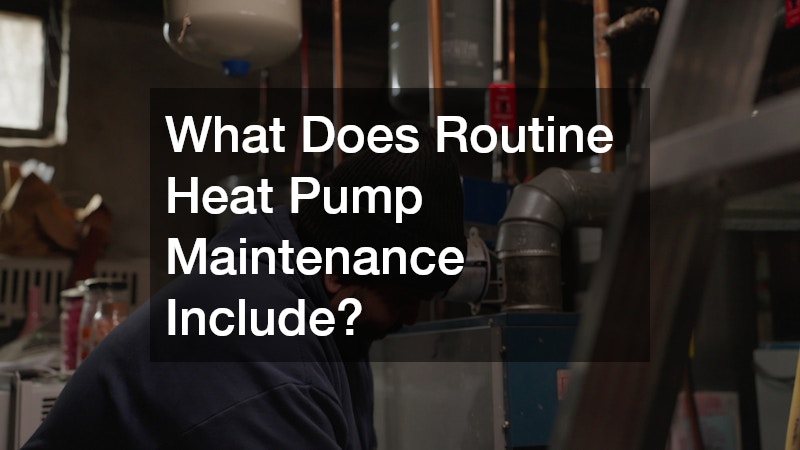Heat pumps are essential for maintaining comfort in your home, especially in variable climates. Identifying the signs of a failing heat pump can save you from unexpected breakdowns and costly repairs. This article outlines common indicators that suggest you need heat pump repair.
How Can I Tell if My Heat Pump is Malfunctioning?
Unusual Noises
When your heat pump starts making scraping, grinding, or loud clicking noises, it signals that there might be a mechanical issue. These sounds often indicate problems with the motor or other internal components that require immediate attention.
Ignoring these noises can lead to further internal damage, exacerbating the problem and potentially leading to a complete breakdown. Addressing these noises promptly can help avoid expensive repairs.
Consulting a professional at the first sign of unusual noise ensures that your system continues to operate smoothly and efficiently. It’s always better to catch a small problem before it escalates.
Inconsistent Temperatures
If certain rooms in your home are never warm or cool enough, your heat pump could be malfunctioning. This inconsistency might be due to inadequate airflow or issues with the unit’s settings.
Such temperature fluctuations can also suggest issues with the heat pump’s sensors or blockage in the system. Consistent performance should be expected from a well-functioning heat pump.
Regularly experiencing uneven temperatures is an indicator to call a professional who can diagnose and rectify any underlying issues. Consistent comfort is a sign of an efficiently operating heat pump.
Why is My Heat Pump Not Heating Properly?
Thermostat Problems
A thermostat that is improperly set or malfunctioning can cause your heat pump to fail in providing adequate heating. Ensuring that your thermostat is correctly calibrated is crucial for maintaining the desired temperature.
Modern thermostats also include programmable settings that can be configured incorrectly, affecting the heat pump’s performance. It’s vital to check your thermostat settings regularly.
For persistent issues, it may be necessary to have a professional evaluate the thermostat and the heat pump system to guarantee compatibility and proper function. Professional assessment can safeguard against frequent inefficiencies.
Refrigerant Levels
Low refrigerant levels in your heat pump system can lead to inadequate heating or cooling performance. The refrigerant is crucial for the heat pump’s operational cycle, and insufficient levels can indicate a leak.
Detecting refrigerant problems early can prevent extensive damage to the system’s compressor, which is costly to fix. Regular checks on refrigerant levels should be part of routine maintenance.
A professional technician can detect and repair leaks, ensuring that your heat pump operates efficiently. Maintaining proper refrigerant levels extends the lifespan of your heat pump and preserves its efficiency.
What Causes High Energy Bills with a Heat Pump?
Dirty Filters
Clogged or dirty filters force your heat pump to work harder than necessary, leading to higher energy consumption. Regularly cleaning or replacing filters can improve the efficiency of your system.
Dirty filters also impose stress on other system components, potentially shortening their lifespan. Keeping filters clean ensures optimal airflow and performance.
Regularly changing filters is an easy DIY task that can positively impact both your energy bills and the longevity of your heat pump. A well-maintained system operates at peak efficiency, reducing costs.
Leaking Ducts
Leaking ducts are a common cause of increased energy bills, as they allow heated or cooled air to escape, wasting energy. Ensuring tight seals on ductwork is essential for energy efficiency.
Duct leakage can significantly compromise the performance of a heat pump, causing it to run longer and use more energy to maintain the desired temperature. Addressing leaks ensures better performance.
Professional duct inspections can identify any leaks or damage, allowing for prompt repair and significant energy savings. Properly sealed ducts contribute to the optimal operation of your heat pump.
When Should I Consider Professional Heat Pump Repair?
Frequent Short Cycling
Frequent short cycling, where the heat pump turns on and off rapidly, is a clear indicator that professional attention is needed. This behavior can be caused by overheating or a miscalibrated thermostat.
Continuous short cycling not only affects your comfort but also places undue stress on the system, leading to premature wear and failure. Identifying the root cause is crucial to prevent damage.
Consulting with an HVAC professional can diagnose and correct the issue, ensuring your heat pump functions correctly and efficiently. A stable cycle ensures consistent heating or cooling output.
Persistent Ice Buildup
If you notice ice continuously forming on your heat pump unit, it might indicate serious problems such as refrigerant leaks or airflow restrictions. Ice buildup can severely affect the unit’s efficiency.
This issue can also result from a malfunctioning defrost cycle within the heat pump. Consistent ice formation should never be ignored, as it can lead to further complications.
Contacting a professional to address ice issues ensures that any underlying mechanical or refrigerant issues are resolved promptly. Timely intervention can restore proper function and efficiency.
What Does Routine Heat Pump Maintenance Include?
Regular Inspections
Regular professional inspections help identify worn parts and ensure all components are functioning effectively. This proactive approach can prevent unexpected failures and costly emergency repairs.
Inspections are key to catching small issues before they evolve into significant problems, safeguarding both your comfort and investment. Routine check-ups contribute to the heat pump’s longevity.
Working with certified technicians can ensure that the correct diagnostics are performed, leading to more reliable and efficient operation of your system. Regular attention to maintenance is invaluable.
Cleaning and Replacing Filters
Regular maintenance includes cleaning and potentially replacing filters, an essential aspect of heat pump care. Clean filters allow for optimal air flow and energy efficiency.
Neglecting to maintain filters can result in strain on the system, ultimately shortening its lifespan. Effective maintenance practices involve regularly addressing this critical component.
A routine that includes filter maintenance promotes consistent temperature control and system reliability. Staying proactive about filter care can prevent unnecessary strain on your system.




